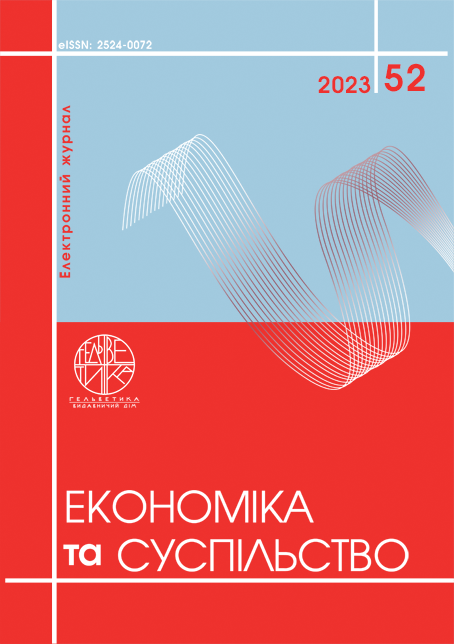ГЛОБАЛЬНИЙ КОНТЕКСТ ПРОЦЕСУ ДІДЖИТАЛІЗАЦІЇ: СУТНІСТЬ, ПРІОРИТЕТНІ ВЕКТОРИ ТА ЗАГРОЗИ
Анотація
Статтю присвячено дослідженню, аналізу теоретичних положень, векторів та цифрових дивідендів і ризиків практичної реалізації процесу цифрової трансформації глобальної економічної системи як імперативу забезпечення сталого розвитку на інноваційних засадах. Досліджено діалектику цифрового формату розвитку та перетворення в розрізі інтересів окремих груп стейкхолдерів даного процесу, наведено частку, окреслено масштаби поширення та значення веб-економіки в структурі глобальної економічної системи. Наведено темпи та прогнозні дані щодо зростання цифрової економіки. Виявлено беззаперечну роль цифрових інновацій та рішень у забезпеченні інноваційної моделі розвитку та посилення конкурентоспроможності як окремих підприємницьких структур, так і національних економік в цілому. Також було ідентифіковано найбільш вагомі ризики та загрози безконтрольного поширення процесу діджиталізації в глобальному вимірі, а також розглянуті деякі механізми, що спрямовано на їхнє повне або часткове нівелювання, які вже активно впроваджуються демократичними урядами, або ж чітко окреслено механізми та часові межі їх майбутньої практичної імплементації.
Посилання
Negroponte N. Being Digital. Knopf, 1995. 256 p.
Mehdi Khosrow-Pour. Encyclopedia of Information Science and Technology, Fourth Edition (10 Volumes). IGI Global, June, 2017. 8104 р.
Апалькова В.В. Концепція розвитку цифрової економіки в Євросоюзі та перспективи України. European Journal of Management Issues. 2015. № 23(4), С. 9–18. DOI: https://doi.org/10.15421/191502
Internet World Stats. URL: https://internetworldstats.com/ (дата звернення: 28.07.2023)
Internet Usage Statistics. URL: https://www.internetworldstats.com/stats.htm (дата звернення: 27.07.2023).
OECD Digital Economy Papers. URL: http://www.oecd-ilibrary.org/science-and-technology/oecd-digital-economypapers_20716826 (дата звернення: 25.07.2023)
Digital economy. URL: http://ec.europa.eu/growth/sectors/digital-economy/index_en.htm (дата звернення: 27.07.2023)
Negroponte N. (1995) “Being Digital”. Knopf. 256 p.
Mehdi Khosrow-Pour (2017) “Encyclopedia of Information Science and Technology”, Fourth Edition (10 Volumes). IGI Global. 8104 р.
Apalkova V.V. (2015) Kontseptsiia rozvytku tsyfrovoi ekonomiky v Yevrosoiuzi ta perspektyvy Ukrainy, European Journal of Management Issues, no 23(4), pp. 9–18.
Internet World Stats. Available at: https://internetworldstats.com/ (accesed July 28, 2023)
Internet Usage Statistics. Available at: https://www.internetworldstats.com/stats.htm (accesed July 27, 2023).
OECD Digital Economy Papers. Available at: http://www.oecd-ilibrary.org/science-and-technology/oecd-digital-economypapers_20716826 (accesed July 25, 2023)
Digital economy. Available at: http://ec.europa.eu/growth/sectors/digital-economy/index_en.htm (accesed July 27, 2023)

Ця робота ліцензується відповідно до Creative Commons Attribution 4.0 International License.


